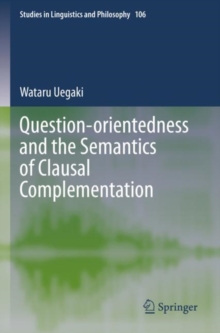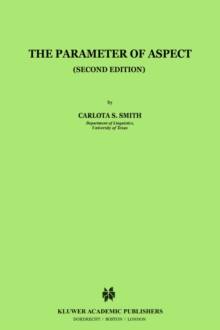
Aspectual Roles and the Syntax-Semantics Interface Paperback / softback
by Carol Tenny
Part of the Studies in Linguistics and Philosophy series
Paperback / softback
Description
All work is work in progress. The ideas developed in this work could be (and probably will be) developed further, revised, and expanded.
But it was time to write them down and send them out.
Some of these ideas about linking had their origins in my 1987 dissertation.
However, this work has grown beyond the dissertation in a number of important ways.
The most important of these advances lie in, first, articulating aspectual roles as linguistic objects over which lexical semantic phenomena can be stated, and over which linking generalizations are stated; second, recognizing that syntactic phenomena may be classified as to whether or not they are sensitive to the core event of event structure; and third, recognizing the modularity of aspectual and thematic/conceptual structure, and associating that modularity with a difference between language-specific and universal language generalizations.
The three chapters of the book are organized around these ideas.
I have tried to state these ideas as strong theses. Where they make strong predictions I have meant them to do so, as a probe for future research.
I hope that other researchers will take up the challenge to investigate, test and develop these ideas across a wider realm of languages than I --as one person --can do.
Information
-
Item not Available
- Format:Paperback / softback
- Pages:246 pages, X, 246 p.
- Publisher:Springer
- Publication Date:31/05/1994
- Category:
- ISBN:9780792329077
Other Formats
- Hardback from £112.49
- PDF from £110.08
Information
-
Item not Available
- Format:Paperback / softback
- Pages:246 pages, X, 246 p.
- Publisher:Springer
- Publication Date:31/05/1994
- Category:
- ISBN:9780792329077










